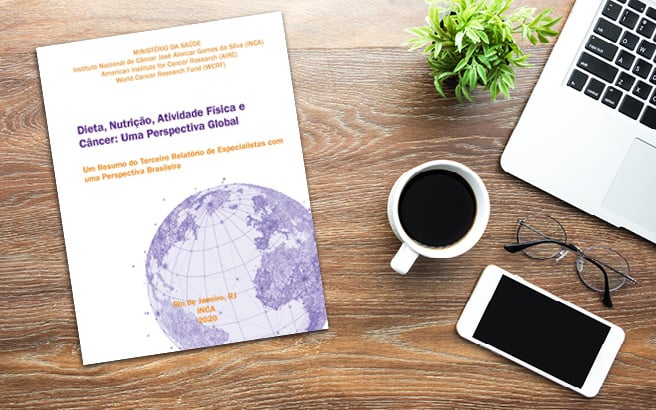 Maria Diogenes from the National Cancer Institute José Alencar Gomes da Silva do Brazil (INCA) explains how the new Portuguese translation of WCRF’s Diet and Cancer Report could help Brazil reduce its cancer burden.
Maria Diogenes from the National Cancer Institute José Alencar Gomes da Silva do Brazil (INCA) explains how the new Portuguese translation of WCRF’s Diet and Cancer Report could help Brazil reduce its cancer burden.
Brazil is a country that has a wide variety of foods from its biodiversity of cultural and nutritional importance. However, the Brazilian food pattern, characterised by the traditional rice and beans, has been changing over the years and the consumption of ultra-processed foods (rich in sugars, fats, salt and high energy density) has been increasing. This change, associated with a high prevalence of physical inactivity (45%) and excess body weight (62%) in the country, imposes a challenging scenario for the control of non-communicable diseases including cancer.
Cancer represents the second leading cause of death in Brazil and 625,000 new cases are expected yearly in the country in 2020–22. Six of the ten most common types of cancer in Brazil, including breast, prostate and colorectal, are associated with poor diet and nutrition, and physical inactivity. Approximately 15% of cancer cases (n = 63,540) and 18% of cancer deaths (n = 33,606) in Brazil were attributed to these factors. Social inequalities impose barriers to healthier ways of life, especially among the poorest, making cancer control even more challenging.
The Brazilian context
The WCRF/AICR Diet and Cancer Report provides global recommendations for cancer prevention through diet, nutrition and physical activity. We translated the report summary into Portuguese and added a local context: Food, nutrition, physical activity and cancer: an analysis of Brazil and the recommendations of INCA. This contains INCA’s recommendations specially for the Brazilian population, the result of adapting global recommendations to the Brazilian context.
In this work, I and other INCA specialists considered a set of information such as:
- the epidemiological scenario of exposure to poor diet, excess body weight, physical inactivity, consumption of beverages (alcoholic, sugary and chimarrão – a drink commonly consumed in Brazil) and breastfeeding
- the strong evidence from the WCRF/AICR related to regional contexts
- the classification of food adopted by the Ministry of Health of Brazil
Among the strong evidence related to regional contexts, we include the recommendation to avoid the consumption of chimarrão in very hot temperatures.
We also adapted the terminology used in the global recommendations to facilitate the understanding of the recommendations by the Brazilian population. The local context also provides information on the burden of cancer in Brazil, potential barriers to adherence to recommendations and challenges in risk communication. We hope to provide technical information to support interventions that promote healthy eating practices and physical activity for the control of cancer in Brazil.
Maria Eduarda L. Diogenes is a nutritionist, PhD in Sciences and manager of the Technical Area of Food, Nutrition, Physical Activity and Cancer of the Coordination for Prevention and Surveillance of the National Cancer Institute José Alencar Gomes da Silva do Brazil (INCA).
- Read the Portuguese translation
